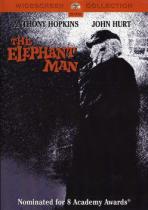The Elephant Man
 Year:
Year: 1980
Film Studio: Paramount Pictures, BrooksFilms Productions
Genre: Drama, Classic
Length: 124 Min.
DirectorDavid Lynch (1946)
WritingChristopher De Vore...Screenplay
Eric Bergren...Screenplay
David Lynch (1946)...Screenplay
Sir Frederick Treves (1853)...Book "The Elephant Man And Other Reminiscences"
Ashley Montagu (1905)...Book "The Elephant Man: A Study In Human Dignity"
ProducerStuart Cornfeld
Jonathan Sanger
CinematographerFreddie Francis (1917)
MusicJohn Morris (1926)...Composer
StarsAnthony Hopkins (1937) as Frederick Treves
John Hurt (1940) as John Merrick
Anne Bancroft (1931) as Mrs. Kendal
John Gielgud (1904) as Carr Gomm
Wendy Hiller (1912) as Mothershead
Freddie Jones (1927) as Bytes
Michael Elphick (1946) as Night Porter
Hannah Gordon (1941) as Mrs. Treves
Review I remember one Saturday night back in late 1980 when my parents came home from the cinema and were lauding over the film they had just seen. My father was an avid movie fan, but dry and artsy films were not to his liking. So when he enthusiastically told me of his appreciation of David Lynch’s
The Elephant Man, I knew that the following weekend I would be sitting somewhere in a darkened theater. As the film ended, I along with the other patrons in the movie hall, sat emotionally drained from witnessing the cruelties inflicted upon this man. Mother Nature had dealt a cruel hand to John (Joseph) Merrick, born with a debilitating genetic combination of
Proteus syndrome and
neurofibromatosis type I; his physical features became grotesquely disfigured throughout his young life. Relegated by his condition to the status of a side show freak, he lived a life of abject scorn and poverty in the squalor of slum neighborhoods in Victorian London.
Rescued by a young doctor named Frederick Treves (Anthony Hopkins), who was interested in the medical aspects of Merrick’s condition, he subsequently would become the curiosity of the aristocracy, as it became clear that Merrick was a man of inner depth and charm. One would think that the years of exploitation at the hands of a drunken carnival barker would have destroyed the man’s ability to co-exist in a world that was outright hostile towards him. It is here that Lynch allegorically compares the similarities between Treves and the barker Bytes (Freddie Jones), as to the varied, yet equally distasteful exploitation of Merrick’s condition. While Bytes needs Merrick to sustain a livelihood, Treves’ utilization of his patient as a stepping stone to medical advancement and prestige is equally disturbing. In the end, Treves’ manipulation is the lesser of the two evils and Merrick spends his remaining days living a docile and charmed existence.
I would remiss in my summary if I did not touch upon the remarkable performance by John Hurt as Merrick. Through his inflections, mannerisms and portrayal we come to accept Merrick for what he truly is; a human being. Many will touch upon the scene where Merrick is cornered in the London subway by an angry and curious mob, and his impassioned response,
I am not an animal!... I… am… a human being!, as the most poignant moment in the film. But for me, it is in the scene with Mrs. Kendal (Anne Bancroft) when she comments on the cardboard cathedral he has created, that is the most touching. As he imparts to her that he must rely upon his imagination to finish the structure, as he can only view the spire from his window, a sense of finality comes across his face as he understands that he is a prisoner of his physical appearance and destined to live a separate and sheltered life.
Many film lovers have debated whether or not this film should have won the Best Picture Oscar for 1980. Up against
Raging Bull and
Coalminer’s Daughter, it would eventually lose to
Ordinary People, a good film in its own right, yet slightly less prestigious in the company of the three mentioned. The true debate to me is whether John Hurt or Robert DeNiro deserved the Oscar for best performance by a lead actor. From my side of the fence, while DeNiro’s portrayal is dynamic in its controlled excesses, Hurt’s performance rings true to the sincerity and compassion of a man who woke up every morning in his own living Hell. It is another time in Academy Award history that there should have been co-winners. If you haven’t seen
The Elephant Man, don’t be put off by the quirkiness of Lynch’s other films. For one time in his career, he stays on a true path of coherent storytelling and the result is emotionally inspiring.
Ratings Criterion5 Stars - The pinnacle of film perfection and excellence.4 ½ Stars - Not quite an immortal film, yet a masterpiece in its own right.
4 Stars - Historically important film, considered a classic.
3 ½ Stars - An entertaining film that’s fun or engaging to watch.
3 Stars – A good film that’s worth a Netflix venture.
2 ½ Stars - Borderline viewable.
2 Stars – A bad film that may have a moment of interest.
1 ½ Stars – Insipid, trite and sophomoric, and that's its good points.
1 Star – A film so vacuous, it will suck 2 hours from the remainder of your life.
½ Star - A gangrenous and festering pustule in the chronicles of celluloid.